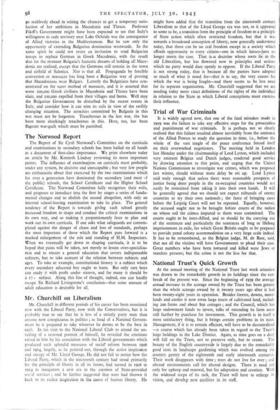Mr. Churchill on Liberalism
Mr. Churchill in different periods of his career has been associated now with the Liberal Party, now with the Conservatives, but it is probably true to say that he is less of a strictly party man than anyone now conspicuous in politics ; as head of a National Govern- ment he is prepared to take whatever he deems to be the best in each. In his visit to the National Liberal Club to attend the un- veiling of a restored portrait, of himself, he revealed the, emotions raised in him by his association with the Liberal governments which produced such splendid measures of social" reform between 1906 and 1914, largely, as he pointed out, through the active inspiration and energy of Mr. Lloyd George. He did not fail to notice how the Liberal Party, which in the nineteenth century had stood primarily for the principle of liberty in all its forms, had turned in 1906 to 1914 to inaugurate a new era in the creation of State-provided social services ; and he further suggested that wars had thrown it back to its earlier inspiration in the cause of human liberty. He
might have added that the transition from the nineteenth century Liberalism to that of the Lloyd George era was not, as it appeared to some to be, a transition from the principle of freedom to a principle of State action which often restricted freedom, but that it was towards a broadened conception of liberty, now generally understood today, that there can be no real freedom except in a society which affords opportunity to every citizen—one in which• laissez-faire no longer meets the case. That is .a doctrine .whose roots lie. in the old Liberalism, but has flowered now in principles arid actions which no party would dare openly to oppose. If the Liberal Party is not strong today, that is because all the parties have adopted so much of what it stood for—that is to say, the very causes for which the war is being fought—and there seems to be less need for its separate organisation. Mr. Churchill suggested that we are needing today more exact definitions of the rights of the individual in relation to the State in which Liberal conceptions must exercise their influence.






















 Previous page
Previous page